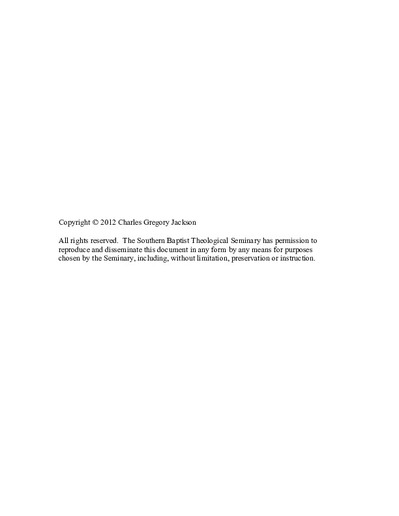The Retributive Justice of God
Subject
holinessjustice
retributive
Abstract
The primary task of this dissertation is to demonstrate from the Old and New Testaments that given the creation and fall of man, the moral character of God will necessarily express itself in retributive justice so that God will impartially and equitably judge and punish sin.
Chapter 1 introduces briefly the subject of God's retributive justice by presenting the current theological climate in which the topic exists. Numerous opponents of retributive justice are cited in an effort to clarify the relevence of current work. Finally, the subject of retributive justice is linked to God's holiness in an effort to show its theological relevence.
Chapter 2 catalogues the various arguments against God's retributive justice. The major objections to retributive justice are discussed in detail in order to better understand those who opposes it. In addition, the discussion is classified into exegetical, theological, and practical objections to God's retributive justice.
Chapter 3 unfolds God's retributive justice as it appears in the Old Testament. After drawing the exegetical connections between God's holiness and retributive justice, biblical examples from the Pentateuch are cited in order to show that the concept of retributive justice appears early and often in Scripture. From here, the study examines numerous Psalms in an attempt to demonstrate that God's retributive justice is apparent in this genre of Scripture as God, the just judge and king, imposes his just rule upon the earth. After treating the Psalms, I show that God's retributive justice is apparent in the covenant curses of the prophets, which come to fruition as a result of Israel's rebellion.
In chapter 4, I argue that the New Testament Gospels adopt the Old Testament's doctrine of God's kingdom but combine it with the Old Testament concept of the priesthood. God imposes his justice in a twofold manner. First, in the inaugurated kingdom, Christ, as the suffering servant and perfect sacrifice, bears the burden of man's sin at the cross as he suffers the wrath of his Father. Second, to consummate the kingdom, Christ promises to return as the Messiah of Psalm 2 and impose his final judgment upon mankind.
In chapter 5, I extend the argument by concentrating on the writings of Paul. I argue that the idea of God's retributive justice is on display in both the realized and future aspects of Christ's kingdom. Focusing on the book of Romans, I show the sustained emphasis on God's wrath that is exhibited at the cross. As in the Gospels, however, the resurrected Christ will return to judge mankind.
Chapter 6 is devoted to the eschatological themes of God's retributive justice in the rest of the New Testament writings, especially those themes in the book of Revelation. Finally, in chapter 7, I conclude by recounting briefly the various arguments in favor of God's retributive justice in order to summarize the persuasive case for my dissertation.

